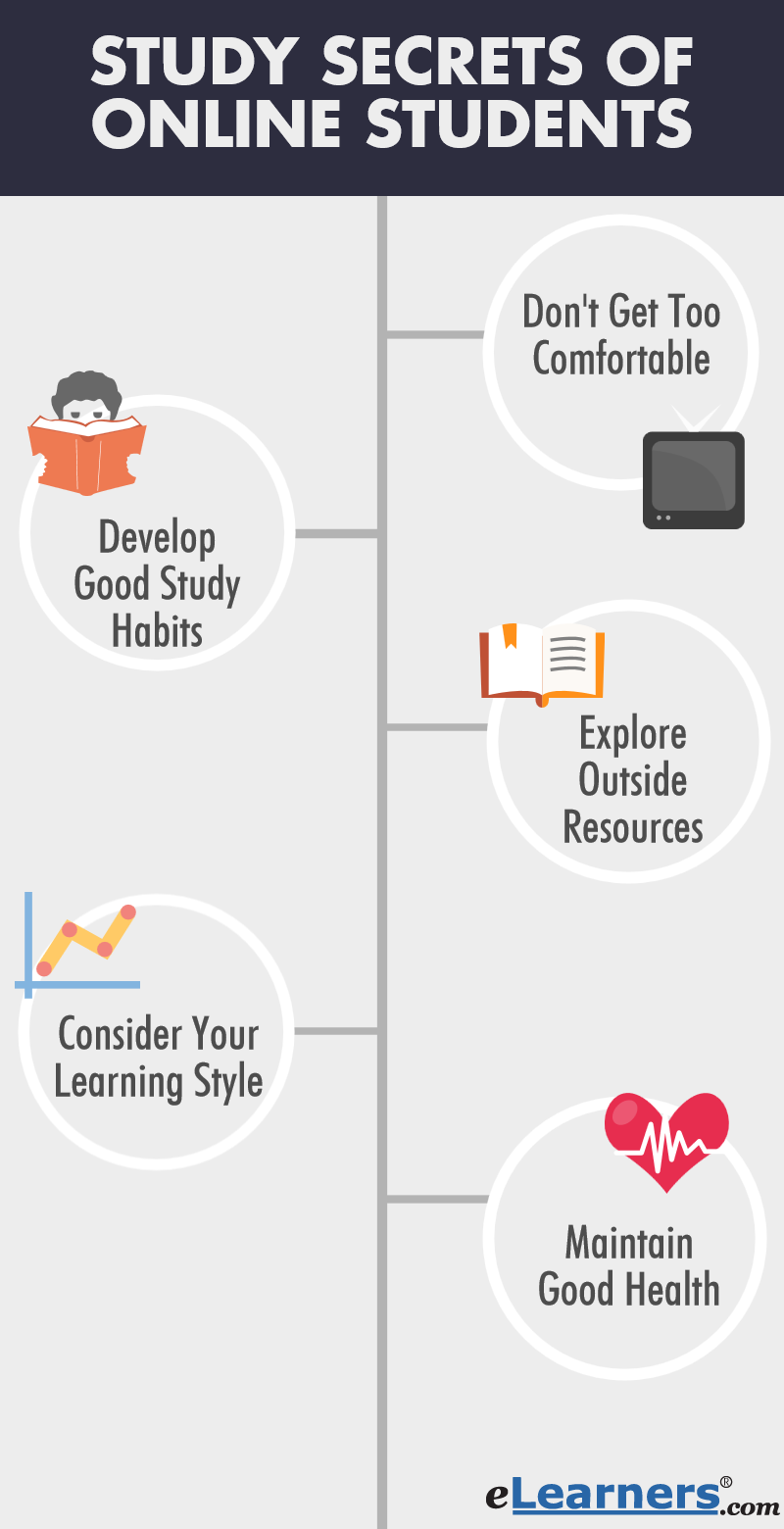 Get Comfortable, But Not Too Comfortable
Get Comfortable, But Not Too Comfortable
Yes, online education allows you to study from the comfort of your home. But don’t let that comfort work against you. You wouldn’t bring a television set and a bowl of cereal to a college classroom. So don’t “attend” your online classes while your TV is blaring and you’re munching on fruit loops. Take your classes seriously. Complete your assignments at a desk or a kitchen table – not lying in bed. Research shows that learning outcomes are better for students who study in a quiet and organized space. If you don’t have that kind of an environment at home, try to do your assignments at a local library or a quiet coffee shop.
Develop Good Study Habits
There’s not a “right” way or a “wrong” way to study, but there are some general guidelines that can help you maximize your efforts.
- Study often. Research has shown that last minute cramming sessions aren’t nearly as effective as shorter study periods that occur on a regular basis.
- Study with partners and alone. Two or three minds are always better than one. Study partners can help you determine the areas where you’re still fuzzy. But it’s up to you to go back and learn the material.
- Study with a pen in hand. Whether you’re reading from a computer screen or reading from a book, you should be taking notes and jotting down questions. Try putting the concepts into your own words. You’ll learn faster and you’ll have ready-made comments for class discussion.
Try to Teach Your Course Material to Someone Else
If you want to succeed in college, you have to practice “active” study skills. Active studying is different from passive studying, whereby you stare at the computer screen, and hope the course content magically floats into your brain. Active studying means that you interact with the class material in a variety of ways. You should read it, write it in an outline, and vocalize the concepts as an explanation to another person. If you’re not able to explain what it is that you’re learning, then you probably don’t have a strong grasp of the material. Use the holes in your explanation as a good place to start studying again.
Pay Attention to Chapter Review Questions
As you encounter new material, it’s important to keep the focal points of each unit in mind. Units are designed to help you build on previous concepts, or to illustrate a progression. If you read the homework questions first, you’ll have some context clues about what’s coming next. You might even begin to draw connections between past lessons and the current chapter. It’s always encouraging to feel like you’re “ready” for the next bit of knowledge.
Explore Outside Resources
As an online college student, you’ll probably receive a textbook and/or a list of assigned readings that will help you to learn the course material. But you shouldn’t feel limited by these resources. If you encounter a concept that’s especially confusing – or, better yet, especially interesting – you should take the initiative, and see what other information you can find. You might come across a website that explains the concept better. Or, you may find an article that changes your opinion about an issue or a theory. Both possibilities can enhance your contributions to class discussions.
Being able to synthesize data from different sources is an advanced learning skill. And even though this kind of exercise isn’t required, it can be good practice for your eventual career. After all, most job descriptions ask you to do more than just read a book and take tests on the content.
Make Flash Cards
Whether you are waiting for your daughter at gymnastics practice, or standing in line at the grocery store, flashcards can help you use your spare minutes to study. Inexpensive index cards or scraps of blank paper can be used to catalog vocabulary words and definitions, math problems, or even essay questions that might appear on an upcoming test. Store them in your purse or wallet so they’re always on hand. If you have school-aged kids, they’ll get a kick out of quizzing you for a change.
Consider Your Learning Style
Education experts have identified several major learning styles. And some people believe that catering to your individual learning style can help you perform better in school. For example, some students are visual learners; they learn best when information is presented in a visual format, like a chart or a diagram. Other students may need to listen to course material before they make a connection. If your online class is only catering to one learning style, take it upon yourself to receive the information in other ways. Check the Internet to see if there are any video clips on the subject. Integrate reading, writing, speaking, and listening exercises. You may discover that one of these methods is especially effective for you. You can then use that method to inform all of your other classes.
Maintain Good Health
All of your health-related choices affect your brain. And let’s face it: you need your brain to study. So make a conscious effort to stay healthy while you’re in school. Fruits, vegetables, proteins, and healthy carbohydrates all contribute to your cognitive abilities. On the other hand, too much sugar and fatty foods can leave your body and your mind feeling sluggish. Sleep and exercise are also key components. In fact, people who exercise regularly are often found to experience deeper, sounder sleep cycles. So try to raise your heart rate for 15 to 20 minutes every day. You’ll wake up feeling more refreshed and more mentally alert.
Jennifer Applin is a freelance writer and will soon be the mother of six young children born within a 5-year span. Her writing focuses on strategies for busy parents to juggle it all.
